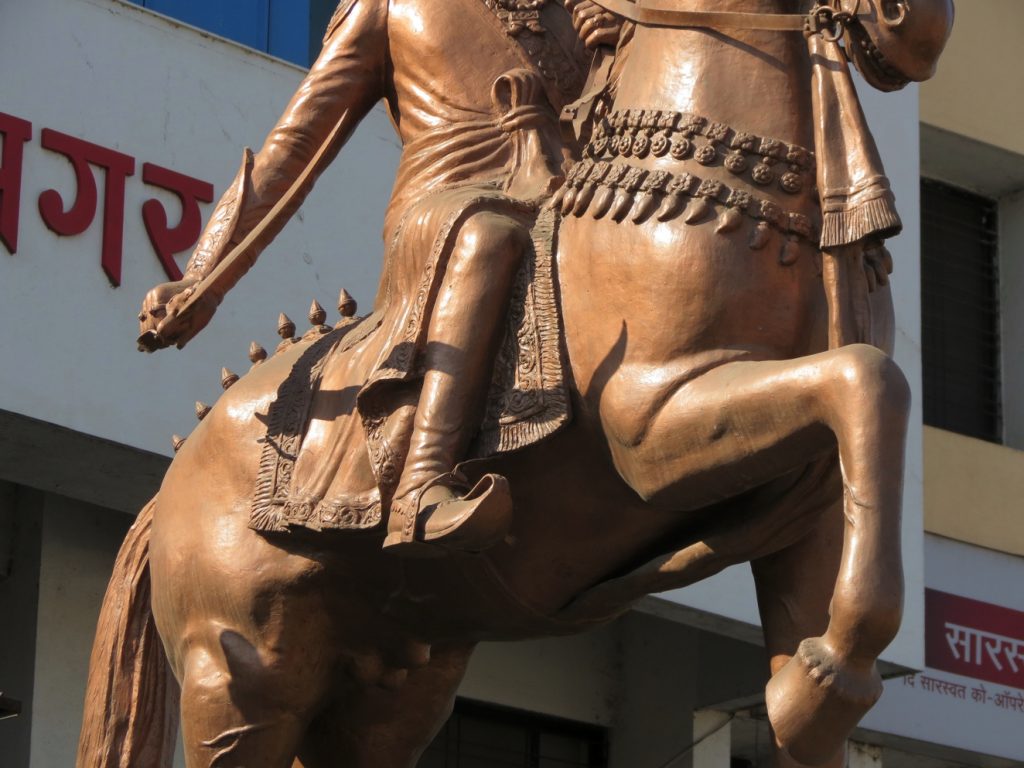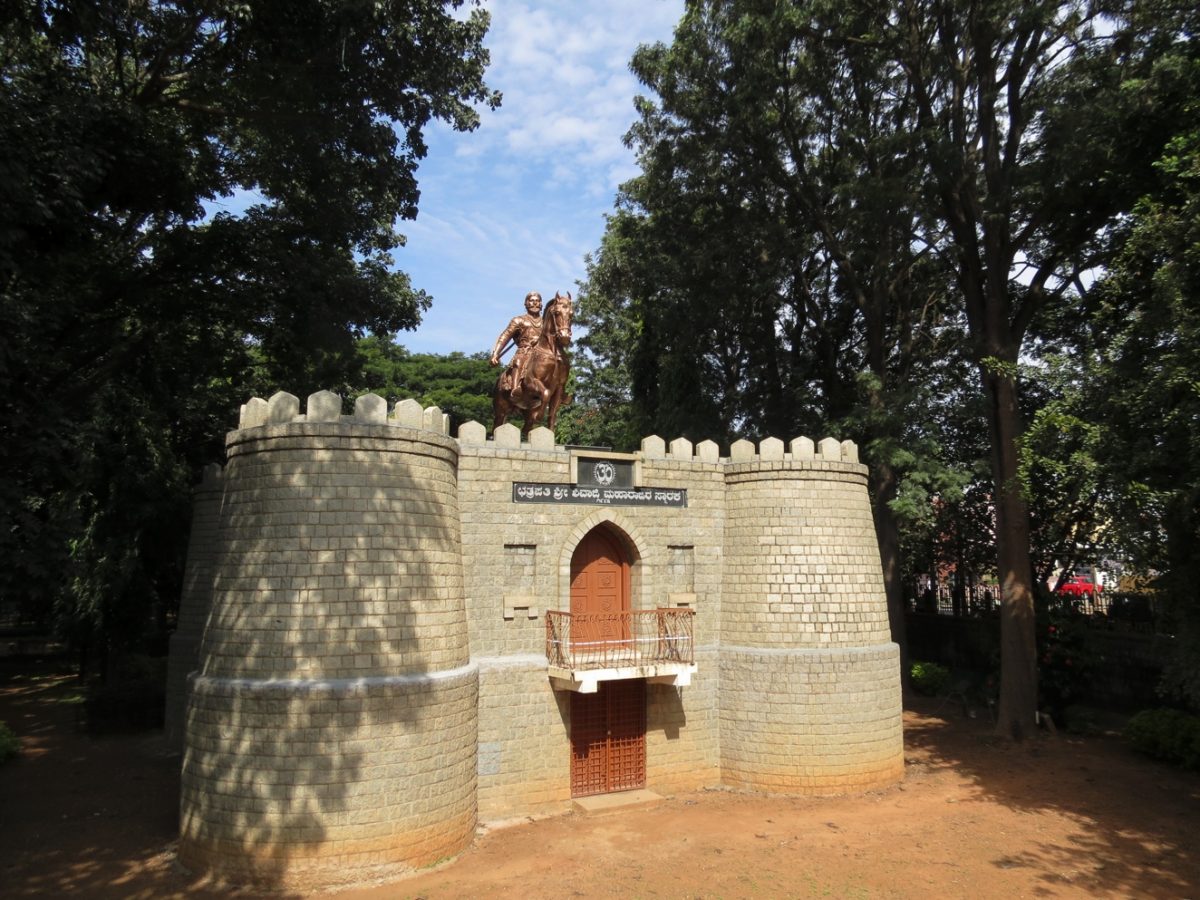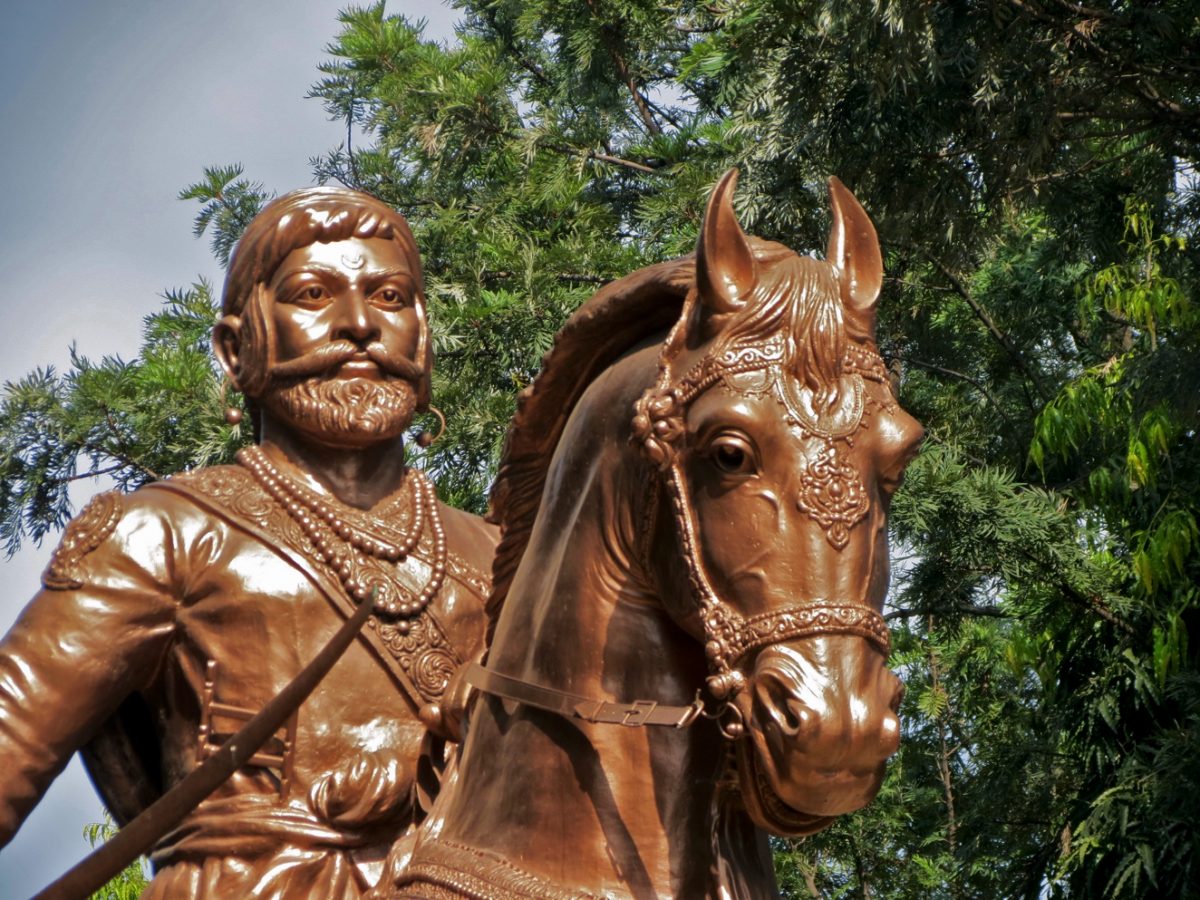Shivaji Bhonsle - A Leader Who Shaped History
Have you ever heard about a person who, against great odds, shaped the very ground beneath their feet? Someone whose spirit of independence still echoes through stories and history books? Well, as a matter of fact, we are talking about a figure whose actions created something truly lasting in India. This individual, a king from long ago, left behind a legacy that continues to inspire and show what is possible when someone stands firm for what they believe in.
This remarkable person, Shivaji Bhonsle, sometimes called Chhatrapati Shivaji Maharaj, was a true force of nature. He was born into a time when many different powers held sway, yet he managed to carve out a place for his own people. His story, you know, is one of great courage and very smart thinking, showing how one individual can make a huge impact on the course of events. It's almost like a tale spun from the fabric of legend, yet it's all rooted in historical fact.
From his beginnings, Shivaji Bhonsle showed signs of being someone special, someone who would not just follow the path laid out for him. He was, in some respects, a true visionary, seeing a different future for his land and working tirelessly to bring it about. His life, pretty much, shows how determination and a clear purpose can lead to the establishment of something truly independent and strong, a kingdom built on principles that were quite progressive for his era.
Table of Contents
- Who Was Shivaji Bhonsle - A Life Story
- Personal Details of Shivaji Bhonsle
- How Did Shivaji Bhonsle Build His Kingdom?
- What Made Shivaji Bhonsle a Unique Leader?
- The Military Ideas of Shivaji Bhonsle
- What Challenges Did Shivaji Bhonsle Face?
- The Bhonsle Family Tree and Shivaji Bhonsle
- What is the Lasting Impact of Shivaji Bhonsle?
Who Was Shivaji Bhonsle - A Life Story
Shivaji I, widely known as Shivaji Shahaji Bhonsale, or perhaps more commonly as Chhatrapati Shivaji Maharaj, was an Indian king. He was a member of the Bhonsle Maratha clan, a family with a long history. His birth, you know, took place on February 19, 1630, though some accounts also mention April 20, 1627, as his birth date. He lived until April 3, 1680. He first saw the light of day within the strong walls of Shivneri Fort, a place near the town of Junnar, which is north of Poona. Interestingly, he was given his name after the local deity of that area, Shivai Devi, which is a rather nice touch, isn't it?
His parents played a significant part in his early life and shaping who he became. His father, Shahaji Raje Bhonsle, was a Maratha general, a leader of soldiers in the Deccan region. Shahaji, in fact, had served the Ahmednagar and the Deccan Sultanate, showing his experience in the military world. His mother, Rajmata Jijabai, was a remarkable woman. She was the daughter of Shri and was known for being a graceful and very religious person. Her deeply held beliefs and personal qualities, quite frankly, had a significant impact on young Shivaji, helping to shape his own character and outlook on life. It's clear, you know, that her influence was quite profound.
Shivaji Bhonsle grew up in a time of shifting powers, with various sultanates and empires holding sway across the land. His father's position, as a matter of fact, meant that Shivaji was exposed to the ways of military command and political dealings from a relatively young age. He was, in a way, being prepared for the extraordinary path he would eventually choose, a path that would lead him to challenge the existing order and create something entirely new. He was, basically, a person who learned from his surroundings and used that knowledge to his great advantage.
Personal Details of Shivaji Bhonsle
Here are some key facts about Shivaji Bhonsle, giving you a quick look at his life and family connections, you know, the basic details that help paint a picture of who he was.
| Detail | Information |
|---|---|
| Full Name | Shivaji Shahaji Bhonsale (Chhatrapati Shivaji Maharaj) |
| Birth Date | February 19, 1630 (or April 20, 1627) |
| Death Date | April 3, 1680 |
| Birthplace | Shivneri Fort, near Junnar, north of Poona |
| Parents | Shahaji Raje Bhonsle (father), Rajmata Jijabai (mother) |
| Clan/Dynasty | Bhonsle Maratha Clan |
| Eldest Son | Sambhaji (Sambhaji Raje Shivajiraje Bhonsle) |
| Reign as King | 1674 - 1680 |
| Key Achievements | Founder of Maratha Empire, independent state in Maharashtra, military strategies, administrative reforms, social justice initiatives. |
How Did Shivaji Bhonsle Build His Kingdom?
Building a kingdom from scratch, especially in a period of established powers, is a truly remarkable feat, and Shivaji Bhonsle managed just that. He started, you know, by carving out his own independent kingdom from the Adilshahi Sultanate of Bijapur, which was, at that time, rather losing its strength. This initial act of creating an enclave was, basically, the beginning of something much larger, laying the groundwork for what would become the Maratha Empire. He didn't just take over; he built something new and separate.
His approach to building this state was quite innovative for the time. The security of his kingdom, for instance, was based on a couple of very important ideas. One was religious toleration, which meant allowing people of different faiths to live together peacefully. This was, in a way, a very forward-thinking idea that helped create a sense of unity among his people. The other key element was the functional integration of different groups: the Brahmans, the Marathas, and the Prabhus. This working together of various communities, you see, was fundamental to the strength and stability of his rule. It wasn't just about military might; it was about bringing people together.
Shivaji Bhonsle created an independent and sovereign state in the Maharashtra region. This wasn't just a small territory; it was a self-governing entity, free from the control of outside powers. He was, in fact, a visionary leader who saw the possibility of a different future for his people, one where they could govern themselves. He is often looked upon as one of the greatest Hindu kings, someone who fought against many different opponents to establish a Hindu kingdom in India. His actions, quite honestly, were driven by a strong desire for independence and a sense of purpose for his community.
He was, basically, a leader who understood that a strong state needed more than just a powerful army. It needed good governance, fair rules, and a way for people to feel connected to their land and their ruler. His administrative reforms and social justice initiatives were, therefore, a big part of how he built and maintained his kingdom. He was, pretty much, a ruler who cared about the well-being of his people, which helped him gain their loyalty and support. This commitment to justice, you know, was a hallmark of his rule.
What Made Shivaji Bhonsle a Unique Leader?
What really set Shivaji Bhonsle apart from others of his time? Well, for one thing, he is considered to be one of the greatest warriors, even today. Stories of his brave actions are told as part of the local folklore, showing just how deeply he impressed people. His boldness, for example, seemed to have no limits, and he possessed an iron resolve, immense courage, and a sense of supremacy that inspired his followers. He was, in a way, a leader who truly embodied strength and conviction.
Beyond his military prowess, Shivaji Bhonsle was also known for his administrative reforms and his efforts towards social justice. This is, you know, quite a significant point because it shows he wasn't just focused on fighting battles. He was also thinking about how to create a fair and well-run society. He was, quite honestly, a ruler who looked after his people, ensuring that the systems in place were beneficial for everyone, or at least tried to make them so. This focus on good governance and fairness really made him stand out.
He is also looked upon as one of the most visionary and influential leaders in Indian history. His ability to see beyond the immediate challenges and plan for a truly independent future was, in some respects, extraordinary. He was, essentially, a person who could inspire loyalty and dedication because his followers believed in his vision and his commitment to their well-being. This combination of military skill, administrative wisdom, and a strong sense of purpose makes Shivaji Bhonsle a truly unique figure in history.
The Military Ideas of Shivaji Bhonsle
Shivaji Bhonsle's military strategies were, quite frankly, a big part of his success. He was, for example, one of the earliest known users of a specific type of warfare that he called "ganimi kava." This approach, which we now know as guerrilla warfare, involved quick, unexpected attacks and then disappearing, rather than engaging in large, open battles. It was a very smart way to fight against much larger armies, allowing his smaller forces to gain an advantage. This was, you know, a very clever way to use the terrain and surprise to his benefit.
He led his warrior clan, often on horseback, into these actions, showing his personal involvement and courage. His troops, basically, followed his lead with great loyalty, confident in his plans and his ability to outsmart their opponents. The idea was to strike fast, cause disruption, and then retreat before the enemy could properly respond. This kept his forces safe and allowed them to chip away at the strength of their adversaries over time. It was, in a way, a war of attrition and cleverness, rather than just brute force.
His military thinking wasn't just about fighting; it was also about security. The structure of his kingdom, as we mentioned, had security built in through religious tolerance and the cooperation of different groups. This meant that his base of support was strong, allowing him to focus on military actions without worrying about internal strife. He was, pretty much, a leader who understood that a strong army needed a strong and united people behind it. This integrated approach, you see, was a key to his lasting success on the battlefield and in building his state.
What Challenges Did Shivaji Bhonsle Face?
Building an independent kingdom meant facing many challenges, and Shivaji Bhonsle certainly had his share. He fought against numerous enemies, as the text mentions, and these were often powerful forces like the declining Adilshahi Sultanate of Bijapur and the vast Mughal Empire. His path was, basically, one of constant struggle and strategic maneuvering against much larger and better-resourced opponents. It was, in a way, a testament to his sheer determination that he managed to stand his ground.
One notable instance of a challenge involved the Mughal Emperor Aurangzeb. Aurangzeb, as a matter of fact, invited Shivaji to Agra, reportedly with the idea of using his military skill to help consolidate the Mughal Empire's hold in Afghanistan. Shivaji traveled to Agra with his eight-year-old son, Sambhaji. However, he was, quite frankly, offended by the way Aurangzeb treated him, which led to a very tense situation. This event, you know, is a significant part of his story, showing the political pressures he faced.
There was, for example, a recent claim by an actor about Shivaji Bhonsle's historic escape from Agra that has caused widespread discussion. This shows that even centuries later, his actions and experiences continue to be a topic of interest and debate, reflecting the impact he had. He also, at one point, agreed to surrender twenty-three forts and pay a sum of 400,000 as compensation to the Mughal Empire, which was, in some respects, a difficult concession but perhaps a strategic one to preserve his forces. These were, essentially, the kinds of hard choices he had to make to protect his people and his vision.
The Bhonsle Family Tree and Shivaji Bhonsle
Shivaji Bhonsle was, you know, a member of the Bhonsle dynasty, an Indian family line connected to the great Maratha king himself. His father, Shahajiraje Bhonsale, was a Maratha general in the Deccan, showing that Shivaji came from a background of military leadership and influence. His mother, Jijabai, as a matter of fact, was a very religious woman whose strong beliefs and good qualities had a big impact on him, shaping his own moral compass and leadership style. This family foundation was, basically, quite important to his development.
The Bhonsle dynasty, in its broader sense, saw other significant figures too. Raghuji Bhonsle of Berar, for instance, founded a branch of the dynasty in 1730, which came a bit later than Shivaji's time. There were, apparently, eight rulers in that particular line. Also, there's a mention of a son of Rajaram from his second wife, Rajabai, who took power by deposing Shivaji II and Tarabai through a palace revolution in 1714. This shows, you know, the complex family dynamics and power struggles that were common in those times.
Sambhaji, whose full name was Sambhajiraje Shivajiraje Bhonsle, was Shivaji's eldest son. He was, basically, a direct continuation of Shivaji's line and played his own part in the ongoing story of the Maratha state. There was also a treaty, the Treaty of Warna, signed in 1731 by Shivaji's cousin, Shahu. This agreement, you see, formalized the existence of two separate seats of the Bhonsle family, illustrating the spread and evolution of the family's influence over time. It's clear, in some respects, that the Bhonsle name carried significant weight and history.
What is the Lasting Impact of Shivaji Bhonsle?
Shivaji Bhonsle, venerated in Maharashtra as the father of "the Maratha nation," left a truly profound mark on history. He is, you know, regarded as the ruler of the people, a title that speaks volumes about how he was perceived by those he governed. His actions created an independent and sovereign state in the Maharashtra region, a significant achievement that changed the political map of India. This was, in a way, a foundational act that inspired generations to come.
His military strategies, like the use of "ganimi kava," are still studied today, showing how forward-thinking he was in his approach to warfare. Beyond the battles, his administrative reforms and social justice initiatives demonstrated a leader who cared deeply about the well-being of his subjects, not just about expanding his territory. He was, quite honestly, a king who understood that a strong state is built on fair governance and the support of its people. This focus on internal strength, you see, contributed greatly to his lasting legacy.
The stories of his exploits continue to be narrated as part of folklore, keeping his memory alive and inspiring new generations. He stands as one of the most visionary and influential leaders in Indian history, someone whose courage, resolve, and supremacy knew no limits. His kingdom's security, based on religious toleration and the working together of different communities, shows a progressive mindset that was quite rare for his era. Basically, Shivaji Bhonsle's life and achievements continue to resonate, reminding us of the power of leadership and the pursuit of independence.
- Off Stamp Vape
- Roger Williams University
- Genevi%C3%A8ve Bujold
- Albuquerque Airport
- Lane Community College

Equestrian statue of Shivaji Bhonsle in Pune, Maharashtra India

Equestrian statue of Shivaji Bhonsle in Bangalore, Karnataka India

Equestrian statue of Shivaji Bhonsle in Bangalore, Karnataka India